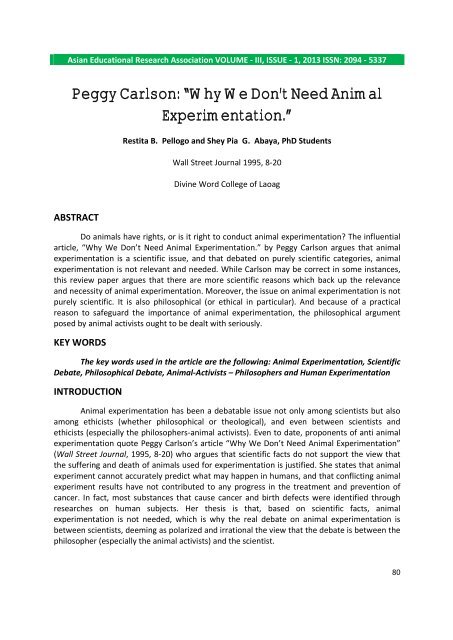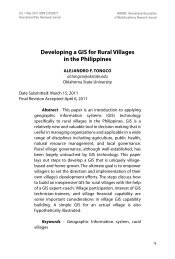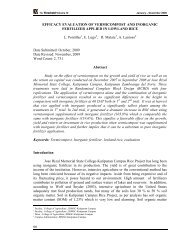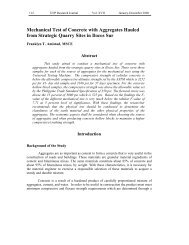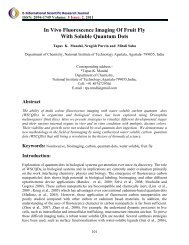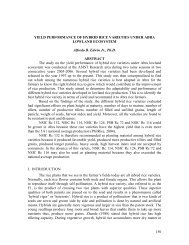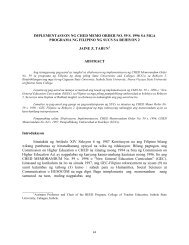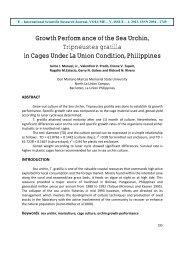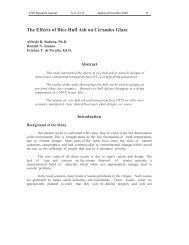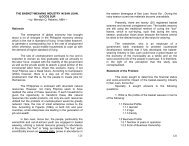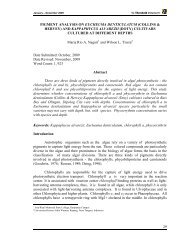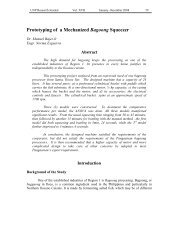Peggy Carlson: “Why We Don't Need Animal Experimentation.â€Â
Peggy Carlson: “Why We Don't Need Animal Experimentation.â€Â
Peggy Carlson: “Why We Don't Need Animal Experimentation.â€Â
You also want an ePaper? Increase the reach of your titles
YUMPU automatically turns print PDFs into web optimized ePapers that Google loves.
Asian Educational Research Association VOLUME - III, ISSUE - 1, 2013 ISSN: 2094 - 5337<strong>Peggy</strong> <strong>Carlson</strong>: “Why <strong>We</strong> Don’t <strong>Need</strong> <strong>Animal</strong><strong>Experimentation</strong>.”Restita B. Pellogo and Shey Pia G. Abaya, PhD StudentsWall Street Journal 1995, 8-20Divine Word College of LaoagABSTRACTDo animals have rights, or is it right to conduct animal experimentation? The influentialarticle, “Why <strong>We</strong> Don’t <strong>Need</strong> <strong>Animal</strong> <strong>Experimentation</strong>.” by <strong>Peggy</strong> <strong>Carlson</strong> argues that animalexperimentation is a scientific issue, and that debated on purely scientific categories, animalexperimentation is not relevant and needed. While <strong>Carlson</strong> may be correct in some instances,this review paper argues that there are more scientific reasons which back up the relevanceand necessity of animal experimentation. Moreover, the issue on animal experimentation is notpurely scientific. It is also philosophical (or ethical in particular). And because of a practicalreason to safeguard the importance of animal experimentation, the philosophical argumentposed by animal activists ought to be dealt with seriously.KEY WORDSThe key words used in the article are the following: <strong>Animal</strong> <strong>Experimentation</strong>, ScientificDebate, Philosophical Debate, <strong>Animal</strong>-Activists – Philosophers and Human <strong>Experimentation</strong>INTRODUCTION<strong>Animal</strong> experimentation has been a debatable issue not only among scientists but alsoamong ethicists (whether philosophical or theological), and even between scientists andethicists (especially the philosophers-animal activists). Even to date, proponents of anti animalexperimentation quote <strong>Peggy</strong> <strong>Carlson</strong>’s article “Why <strong>We</strong> Don’t <strong>Need</strong> <strong>Animal</strong> <strong>Experimentation</strong>”(Wall Street Journal, 1995, 8-20) who argues that scientific facts do not support the view thatthe suffering and death of animals used for experimentation is justified. She states that animalexperiment cannot accurately predict what may happen in humans, and that conflicting animalexperiment results have not contributed to any progress in the treatment and prevention ofcancer. In fact, most substances that cause cancer and birth defects were identified throughresearches on human subjects. Her thesis is that, based on scientific facts, animalexperimentation is not needed, which is why the real debate on animal experimentation isbetween scientists, deeming as polarized and irrational the view that the debate is between thephilosopher (especially the animal activists) and the scientist.80
Asian Educational Research Association VOLUME - III, ISSUE - 1, 2013 ISSN: 2094 - 5337CLAIM<strong>Peggy</strong> <strong>Carlson</strong>, in her article “Why <strong>We</strong> Don’t <strong>Need</strong> <strong>Animal</strong> <strong>Experimentation</strong>.” Claims thatanimal experimentation is mainly scientific in nature, which is why any debate on it ought to bein science; accordingly, such debate would reveal that there is no need for animalexperimentation.<strong>Carlson</strong>’s arguments may be applicable in some situations, but these cannot adequatelysupport her view, nor make her view valid in all situations. Although the need for animalexperimentation is doubted by many scientists due to its flaws and failures, however itssignificant contributions to human health are overwhelming, making animal experimentationethical and a necessity in many cases. Moreover, animal experimentation can be validly andrationally debated not only between scientists, but also between the scientist and the animalrights activist, and such debate is crucial and important.REASON<strong>Carlson</strong> has a point because in some cases, animal experimentation may not be relevantto the advance of human health. But this reason is but fragmentary compared to theoverwhelming scientific and ethical reasons that support the necessity and ethical validity ofanimal experimentation, to wit: (i) In many cases, animal experimentation has contributed a lotto human health. (ii) Without animal experimentation, we have to resort to the only viablealternative: human experimentation which is ethically very controversial. (iii) The debatebetween philosophers (especially animal activists) and scientists on animal experimentation issubstantially rational and valid. (iv) Finally, the greater issue between the animal rights activistand the scientists is that the pressure caused by animal rights activists, and the consequence ifthey succeed are too crucial and vital to be ignored by scientists.EVIDENCEThe pieces of evidence that support the aforementioned reasons are the following: (a)Morrison (as cited in Gluck and Bell, 2003), Ellen Franken Paul (2002) and <strong>We</strong>atherall’s study (ascited in <strong>Animal</strong> Research, 2002) claim the indispensability and inevitability of animalexperimentation in the advancement of biomedical science, genetics and psychiatry and thelike. (b) <strong>We</strong> are not against minimal risk human experiments which safe, legal and ethical asregulated the Research Ethics Board (REB) of Canada (Lloyd and Srebrolow, 2007, p. 51). Butwhen the only viable option left when humans should not be put to the risk, as Paul (2002)says, we need animal experimentation. (c) <strong>Animal</strong> activists are also philosophers (like PeterSinger) who use reason to back up their advocacy, which is why it is unfair to brand their debatewith scientists as polarized and irrational. (d) Finally, they pose an urgent and important issue:Matfield (2002) argues that philosophers-animal activists should be convinced of theimportance of animal experimentation because they are influential, and their attack may affectthe value and relevance of animal experimentation.81
Asian Educational Research Association VOLUME - III, ISSUE - 1, 2013 ISSN: 2094 - 5337DISCUSSIONAs <strong>Carlson</strong> rightly points out, in some cases, animal experimentation may not besignificant or helpful to human health. Reiss (as cited in O’Neill, 2009) argues that animalexperimentation is a “pseudo science” and its practice “amounts to playing Russian roulettewith our health” (p. 33). He bases his argument on the fact that in the testing and assessmentof the toxicity of a chemical (which Reiss does not specify), “an animal model will reactaccording to its species-characteristic biological pathways, which may be opposite, similar to ordifferent from those of the (human) species being researched” (Reiss as cited in O’Neill, p.33).Reiss may be right about this particular situation, but he seems to universalize his view, which isnot valid because one example may not present the whole picture. Consequently, Reiss—likening animal experimentation to playing Russian roulette with human health—appears tounduly frighten the public about the conduct of all kinds of animal experiment.However, in many cases, animal experimentation is significant and necessary; in fact, ithas contributed a lot to human health. There are overwhelming scientific facts supporting itsvalue and necessity. Morrison (as cited in Gluck and Bell, 2003) claims that animalexperimentation is necessary for the progress of biomedical science and psychiatry (p. 9). Also,Paul (2002) states that the roster of research projects which won the Nobel Prize from 1901 to1996 “reveals just how critical animal experimentation has been to the understanding ofbiological functions, pathogens, genetic diseases, and their treatment” (p. 8). And amidst theethical controversy on the use of non-human primates owing to their prominent similarities tohumans, <strong>We</strong>atherall’s study (as cited in <strong>Animal</strong> Research, 2002) concluded that “it would beunwise to make any blanket statements about stopping work in this field” (p. 591). Despite thecontroversy, a judicious and regulated use of non-human primates for experimentation may bejustified for the greater good of human health.There is no viable alternative to animal experimentation, except humanexperimentation which is ethically very controversial. Granting that animal experimentation isabsolutely forbidden, and we need to conduct tests on drugs, medical equipment and operatingprocedures, we are left with nothing but the human being to experiment on. Humanexperimentation is a lot more complicated and controversial, and must be avoided as much aspossible. <strong>We</strong> are not against low or minimal risk human experiments which can meet ethical,legal and safety standards set by competent authorities, say the Research Ethics Board (REB) ofCanada (Lloyd and Srebrolow, 2007, p. 51). But when potential and vital cures for humans, orwhen potential but untested medical apparatus or surgical procedures may be highlydetrimental to human life and dignity during experiments, we strongly believe that humansshould not be put to the risk by being used for experimentation. However, this does not meanthat researches for the betterment of human health should be stopped. Research may stillproceed with animal experimentation, the only viable option left when humans should not beput to the risk. In connection, Paul (2002) explains that “in most cases there are no goodsubstitutes for animals as experimental subjects, as proxies for how the human body may reactto new drugs and chemical substances, and as subjects for new medical devices and surgicaltechniques” (p. 9).82
Asian Educational Research Association VOLUME - III, ISSUE - 1, 2013 ISSN: 2094 - 5337The debate between philosophers (especially animal activists) and scientists on animalexperimentation is substantially rational and valid. The necessity of animal experimentationmust be defended not only from the attack of scientists, but also from the attack ofphilosophers, particularly those who are inclined to animal rights activism. It may be viewedthat the advocacy of animal rights activists is rationally pointless since animals are non-rationalbeings, which is why neither are they properly attributed as having rights nor capable ofasserting rights. This, notwithstanding, the advocacy of animal rights activists is valid because ithas a rational basis. In fact, it is based on the philosophy of Peter Singer who contends that“animals can suffer,” a characteristic that animals share equally with humans, which is whyhumans should take animal suffering into equal consideration (Singer as cited in Pojman, 2009,p. 88). <strong>We</strong> are not saying, though, that we agree with Singer and the animal rights activists. Ouronly point is that animal activists use reason to back up their advocacy, which is why it is unfairto brand their debate with scientists as polarized and irrational. And animal activists must bedealt with seriousness because, more than their rational advocacy, they pose an urgent andimportant issue.Finally, the greater issue between the philosophers-animal rights activist and thescientists is that the pressure caused by philosophers-animal rights activists, and theconsequence if they succeed are too crucial and vital to be ignored by scientists. Scientists haveto be more open to the public about the inevitability and necessity of animal experimentation.More importantly, they have to convince animal rights activists, who, if not well-informed andpersuaded, will always attack the value of animal experimentation (Matfield, 2002, p. 152).<strong>Need</strong>less to say, their pressure is not without significant impact. If they succeed in absolutelystopping the conduct of animal experimentation, the consequence on the advancement ofresearches for the betterment of human health will be disastrous. <strong>We</strong> need animalexperimentation so badly that we cannot afford to put it to the risk. And, we think that viewingthe debate between the animal rights activist and the scientist as polarized and irrational—andtherefore unimportant and misleading—may cause us to set aside and to fail in addressing thevery vital issue as well as the significant impact posed by animal rights activists.The issue on animal experimentation is not really about its being absolutely good orabsolutely bad. To our mind, in most cases, there is nothing which is perfectly good norperfectly bad, which is why it is unwise to take absolutist positions. Something may beinsignificant or bad in a certain context, but it may be good, significant and even necessary inanother context. <strong>Animal</strong> experimentation is pretty much the same. <strong>Animal</strong> experimentation isgood or bad, necessary or unnecessary, depending on the circumstances. In some situations,animal experimentation is good, necessary or a necessary evil if you will. Certainly, in thesesituations, we should not be blind to the fact that we do need animal experimentation.And though our hearts break when we see a cat experimented on, this we can bear if itcan spare our beloved children from suffering and harm.83
Asian Educational Research Association VOLUME - III, ISSUE - 1, 2013 ISSN: 2094 - 5337REFERENCES<strong>Carlson</strong>, P. (1995). Why <strong>We</strong> Don’t <strong>Need</strong> <strong>Animal</strong> Exprimentation.Wall Street Journal,8-20)Ellen. F.P. (2002). Why <strong>Animal</strong> <strong>Experimentation</strong> Matters.Society.Gluck, J. P. & Bell, J.(2003). Ethical Issues In the Use of <strong>Animal</strong>s in Biomedical andPsychopharcological Research.Psychopharmacology. Springer –VerlagMatfield, M. (2002). <strong>Animal</strong> <strong>Experimentation</strong>:The Continuing Debate. Perspectives. Vol. 1)McMillan Magazines, Ltd.O’Neill, C. (2009). <strong>Animal</strong> <strong>Experimentation</strong> is a Fraudulent Scicence. Nursing Standard. Vol. 23,No. 23.Singer, P. (1975).The Case for <strong>Animal</strong> Liberation.<strong>Animal</strong>. <strong>Animal</strong> Liberation.Pimlio. UKTracey, TL & Srebrolow G. (2007). Research Ethics Approval for Human and <strong>Animal</strong>Eperimentation:Consequences of Failing to Obtain Approval – Including Legal andProdessional Liability.J. Journal of Canadian Chiropractic Association . 51(1):56–60.Editorial Comment.(2007) <strong>Animal</strong> Research: The Debate Continues. Journal of Internal MedicineBlackwell Publishing Ltd84


